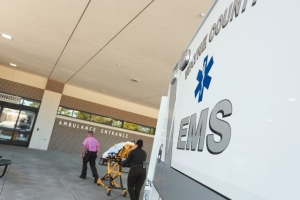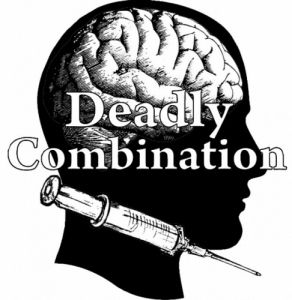Part I -- The Casualties: An ongoing battle - Treating the addicts
By Rochelle Moore
Published in News on December 6, 2017 5:50 AM

News-Argus/CASEY MOZINGO
Wayne County has seen an increase of drug overdoses in recent months, surpassing last year's total in late October. It is estimated that Wayne County EMS responds to one to two each day and the ages of victims range from teenagers to seniors.

News-Argus/CASEY MOZINGO
Denise Bruce has seen it all before.
An adult, anywhere between the ages of 20 and 40, enters the emergency room lethargic, with a low pulse and a very low blood pressure reading. Breathing may be slowed, speech a little slurred.
Medical staff still have to work through a diagnosis, but most people will admit to a drug overdose.
"A lot of them are very honest because they don't want to die -- they want the high," said Bruce, a registered nurse and Emergency Department clinical director at Wayne UNC Health Care.
Wayne UNC Health Care is like many other hospitals across the state and nation, treating an increasing number of people in the throes of an overdose.
The opioid epidemic has claimed 33,000 lives in 2015 and nearly 64,000 in 2016 in the United States, according to the Centers for Disease Control and Prevention.
Across North Carolina in 2015, there were more than 1,100 opioid-related deaths, reflecting a 73 percent increase over the past decade.
Accidental deaths from opioids are also starting to rise in Wayne County, with six reported in 2012, nine in 2015 and 15 in 2016, according to the state Office of the Chief Medical Examiner and the N.C. Department of Health and Human Services.
Wayne UNC Health Care has been treating an increasing number of patients experiencing an overdose in recent years.
"I'd say over the last couple years, we're seeing it more frequently," said Kevin Lee, a registered nurse and Emergency Department supervisor at Wayne UNC Health Care. "Certainly, it's on the rise, I would say."
From time to time, the emergency department will experience a surge of people seeking treatment, similar to a three-month span in 2016, when people were being treated daily at the hospital, primarily for heroin overdoses.
From Sept. 1 through Oct. 12, there were 45 people -- an average of almost one per day -- who sought treatment for an overdose in the emergency department at Wayne UNC Health Care, Bruce said.
"Most, I would say, is age group from 20 to 40," she said. "It can be anybody. It's all walks of life. It's non-discriminatory."
Some of the overdose patients are seeking treatment more than once, Lee said.
"I will say that a lot of our numbers are skewed because it's a lot of the same people coming back that have an addiction problem," he said.
Because the hospital isn't tracking specific overdose data, including the substances involved, the overall figures include all types of overdoses.
". . . those overdosing is not necessarily related to opioids," Bruce said. "It could be a child that took grandma's pills. It could be a grandma who is hurting a little bit and instead of taking one pill, takes three pills.
"So our overdoses are a combination of things and not specifically related to the current problem."
In 2016, emergency departments across North Carolina treated more than 4,100 opioid overdoses, an average of 11 per day, according to the N.C. Hospital Association.
The number of Wayne County residents who received treatment for an opioid overdose in the emergency room more than doubled from 2015 to 2016, according to the N.C. Hospital Association.
In 2015, 43 patients with a Wayne County address were released from the emergency department after receiving treatment for an opioid overdose. In 2016, that number increased to 94, according to hospital association figures.
Statewide, there were 646 opioid overdose emergency department visits in August, reflecting an increase from the 419 visits recorded statewide in August 2016, according to the N.C. Injury and Violence Prevention branch of the state Department of Health and Human Services.
"Everytime you're using heroin, you're gambling with your life," Lee said.
The use of heroin is contributing to the increase in overdoses locally, he said.
"Right now, heroin is very popular," Lee said. "I probably would say every week, at least somebody has come in that has overdosed."
Emergency department staff work to educate patients about the realities of overdosing, whether it be from prescription medicine or street drugs. They are also provided with treatment referral information.
"We do what we can," Lee said. "I think all of them know, the next time they do it, they could die."
Most patients that seek treatment in the emergency department are able to pull out of an overdose, Bruce said. Hospital staff don't focus on whether a substance is illegally sold on the street. It's more about saving lives.
"For us, it's not so much what you took," Bruce said. "For us, it's about your life and what we have to do to help you."
